
How to work with young people Introduction
How to work with young people Introduction Young people and their teachers, youth leaders and parents are some of the most receptive audiences. These guidelines give you ideas about ways to contact and work with them. This briefing covers: Why work with young people? ......................................................................................... 1 How to contact your Local Education Authority & Youth Organisations ........................... 1 How to approach schools and youth clubs ...................................................................... 2 How to plan a session ..................................................................................................... 4 How to engage young people .......................................................................................... 7 Following up after your session and supporting the very keen ....................................... 11 How to join the youth & education network .................................................................... 13 How to find out more ..................................................................................................... 14 Why work with young people? Young people are the next generation. They are important future decision makers and stakeholders. Young people are concerned about their environment. Many already hold strong views about the issue. Allowing young people to discuss environmental issues, to develop a deeper understanding and voice their concerns can be a positive, fulfilling experience both for you and for them. Educating young people will help them develop valuable skills and knowledge and help them make informed decisions in the future. What is your role? You might want to visit schools and youth clubs and work directly with young people, by giving talks and running sessions to inspire and educate. Perhaps you would rather act as an advisor to educators or school Governors, to provide expertise and solutions. How to contact your Local Education Authority & Youth Organisations Local Education Authorities (LEAs), support and challenge schools to improve their performance. They ensure every child has a school place, and are responsible for schools within their borough or county. Find the contact details for your LEA either under ‘Local Services’ in the Yellow Pages or by searching on the internet (search for your local council website, and from here there should be a page under Services called ‘Education and Schools’ or something similar). Alternatively the Department for Education and Skills site has a list of all the LEAs in the country, listed alphabetically - www.dfes.gov.uk/localauthorities/ then click on the Local Authorities address finder link. How to... work with young people Find the contact details for your local schools either through your LEA (as above) or through www.schoolswebdirectory.co.uk/ which includes a postcode, county or LEA search facility. For a free printed list of school addresses call your LEA. If you have access to the internet and follow the above instructions, you are likely to be able to find a list of schools in your area with addresses and telephone numbers, and often the name of the head teacher. There may also be a link to schools’ individual websites if they have them. It can also be worthwhile calling your LEA to ask them questions such as: Is the LEA running any environmental projects? Are there any environmental events/initiatives taking place locally? Do they know of any schools that are already working on environmental projects eg improving their school grounds, or running environmental clubs after school? Are there any Eco Schools in the area? You may also want to consider asking the LEA to send something to all your local schools (maybe a flyer advertising your services as a speaker, or some background information about Friends of the Earth). Find the contact details for your local youth clubs/organisations either by doing an internet search (type find a youth club followed by the name of your town or Borough eg find a youth club Brighton) or by contacting your local Development Education Centre (DEC) who should be able to advise you. Visit http://www.dea.org.uk/sub-440652 for a complete list. How to approach schools and youth clubs There are plenty of opportunities to work within both schools and youth clubs. They often appreciate help from an outside specialist, particularly if you can act as an expert on an environmental issue. A teacher from Broadmayne Primary School in Dorset, says: A new face adds interest – children like experts.” Before you approach a school or youth club, be clear about why you are contacting them. What do you want to do and what do you need the school / group to do to make this happen? Remember, teachers and youth workers like as much advance warning as possible. Schools Start by telephoning the school receptionist to find out which teacher - get their name - is responsible for: assemblies; school environmental clubs; after school clubs; specific subjects such as geography; citizenship; PSHE and science. State which year you wish to talk to eg Year 7 (11-12 year olds). If you cannot get through to a receptionist then write to the Head of year for the age group you wish to talk to. Heads of year are often also PSHE and citizenship coordinators. Youth groups As with schools it’s important to try and find a named contact within the youth group to write to. However, as youth workers are not required to do work around the environment or sustainability there won’t necessarily be a specific member of staff with this remit. The 2 How to... work with young people best thing to do is telephone the youth group, explaining that you are interested in doing some work with them on environment issues, and find out if there is a youth worker there with a particular interest in the field. Christian Aid, WWF and People and Planet all have regional staff that may be able to put you in touch with interested youth workers. Top tip! Janet and Tania from South Cheshire Friends of the Earth say that: “Writing to a named contact and enclosing information about our local group with contact details, a questionnaire for the teacher/youth worker to indicate their interest, details on what we can talk about, and a stamped addressed envelope has increased the response rate and means we have visited more young people”. You can follow up your letter with an email or phone call. When to make your approach Avoid the start of a new school term – teachers are always very busy (Local Authority websites should offer a list of school term dates). December is also a bad month as they are gearing up for Christmas. Research (conducted by Marketability) also suggests that letters or emails arriving at a school on a Monday or a Friday are less likely to receive attention. Following these simple rules should improve your response rate: Avoid exam times. Never mail a school within two weeks either side of a holiday. Aim for your letter to arrive Tuesday to Thursday where possible. Put yourself in their shoes; think about when your audience wants to hear from you. If you are phoning a school, it’s best to call during lunch time or after 3.30pm. Alternatively ask the receptionist if the teacher you are trying to contact has a free period. There are no hard and fast rules for youth groups, although it’s worth noting that many also break over the summer, Easter and Christmas. Get the facts Once a visit has been agreed make sure you find out: date time where the school/club is how many people you are talking to if it is a mixed/single sex group the age of the young people you are speaking to how long your session is going to be topics they have already covered. Linking to the National Curriculum If you are planning to go into a school then it is beneficial to link your session to the National Curriculum. This will make it easier for teachers to accommodate your visit into their schedule and to provide focus to your session. Environmental education can be 3 How to... work with young people linked under many curriculum subjects and we have summarised the three key areas below. For a more detailed guide to the National Curriculum and suitable activities which fit within the subjects see http://www.foe.co.uk/community/youth Personal social and health education (PSHE) – helps pupils to lead confident, healthy and responsible lives as individuals and as members of society. Citizenship – gives pupils the knowledge, skills and understanding to play an effective role in society at local, national and international levels. Global dimension and sustainable development – helps young people to appreciate issues of global significance (issues such as poverty, inequality, conflict and economic and environmental damage) and to recognise their responsibilities as members of a global community. Visiting a youth group can be slightly more complex as youth workers have no statutory or professional obligation to do work around the environment, sustainability or global issues. However, both the National Youth Agency and Lifelong Learning UK have set recommended guidelines for the inclusion of issues concerning sustainable development, climate change and citizenship into their learning framework. Furthermore, the Development Education Foundation has recently introduced a global issues statement into the training outline for Youth and Community studies/qualifications. All youth workers are interested in providing stimulating activities for young people that enhance social and communication skills, help young people to play a useful role in their community and develop a sense of empowerment. Some tried and tested ideas include organising a debate and encouraging young people to make their own TV/radio interviews to discuss and highlight the issues important to them. Alternatively building on your own experiences, teaching young people how to lobby their council and media about an environmental issue can give them a sense of empowerment and motivation. How to plan a session Talking to young people can be challenging, rewarding and enjoyable, and by remembering a few key things need not be scary! Know your audience When working with children and young people it’s important to know who you are talking to. How old are they and what do they already know about the topic? Think back to when you were that age. What was most important to you? What made you excited? These sorts of questions will help you get a better sense of your audience. Be prepared The best way to feel confident is to be prepared. Set clear aims and objectives – it’s better to focus on one point rather than trying to teach everything at once. How long is your session? – break it down into smaller more manageable timeslots. Open your session with a bang – a gimmick often helps grab attention. What method are you going to use? You may want to use more than one in a session. Are they appropriate for the age you’re working with? (see page 7 for more on teaching methods). Have a backup activity in case things go more quickly than expected. How are you going to round off your session? Summarise the session. Maybe do a quick question and answer (Q&A) session or a short quiz. 4 How to... work with young people You can use the quick Q&A or a short quiz to evaluate how the session went: Did it meet the objectives you set? Did the young people enjoy it? Did you enjoy it? What would you do differently next time? What resources do you need for your session? Who is going to provide them? Remember, whatever you decide for your session, the teacher/youth leader must be present at all times to comply with our Child Protection Policy. For more guidance on planning, download the How to plan a session template from http://www.foe.co.uk/community/youth In the classroom/youth club: Be relaxed and enthusiastic. Speak to young people as you would to adults. Answer questions: If you don’t know, say so and offer to find out. Encourage all participants to speak, and listen to their points of view. Explain any technical points you make. Use props or visual aids where possible. Use a variety of techniques for short attention spans. Only give handouts when you’re ready for them to be read. Health & safety It is really important to think through any possible hazards and ways to reduce or remove the risk of harm. This can be as simple as considering the room set up or materials you need and ensuring that you take steps to minimise any risks eg making sure cables are not a potential trip hazard, that materials do not have sharp edges, or that the fire escape is not blocked. For a template risk assessment sheet go to http://www.foe.co.uk/community/youth and follow the link to the Child Protection Policy. Child protection It is important that you have read and incorporated the code of practice for working with young people (as detailed in Friends of the Earth’s Child Protection Policy) into your planning. 5 How to... work with young people Planning template Full version http://www.foe.co.uk/community/youth Preparation prompts Notes Topic What activity are you going to deliver? eg quiz / assembly. How many students? What age are the students? What are you hoping to achieve? aims (general) objectives (specific & measurable). National Curriculum links? Timings - make a time plan. What research is needed? logistics eg room size / layout student knowledge / special needs. What method (s) will you use? Eg explanation, Q&A, discussion. What resources will you need? Are there any health & safety / child protection issues? If yes, what actions do you need to take? How will you evaluate the session? Further considerations How will you involve the media? Will you be offering any follow up? 6 How to... work with young people How to engage young people Ways to communicate with young people There are many different ways of communicating – quite often we associate communication with verbal and face-to-face contact. Face-to-face communications can take place through Workshops in schools, youth groups, after-school clubs, drama and arts clubs, faith groups and other interest groups. Street stalls and festivals. However not all communication takes place in person, and there are many effective ways to get your message across to young people without actually being present. Non face-to-face communication can take place through Radio (research you local area to see if there are any community-based radio projects). Magazines, newspapers and youth-oriented publications (your local authority Connexions youth service may have a regular magazine). Internet (use your own Friends of the Earth website or communicate your message through youth-oriented websites in your area). Posters and design-work. Flyers with youth-oriented messages about environmental and social issues. Displays in schools (schools often have themed weeks such as Arts or Fitness and you can creatively tie in Friends of the Earth messages with these). Language Using the right type of language and, in face-to-face contact, the right tone and bodylanguage, are all extremely important in getting your message across effectively. Research your audience well beforehand – be aware of the culture and mindful of the kinds of peer pressures likely to be felt by the age group you are working with. Always try and link what you are saying to their experiences and give examples of how they can make changes in their everyday lives. And remember that all young people are not the same – as with adults, they have diverse opinions and will all respond to you differently. Some simple do’s: be informative be inspirational be respectful be clear pitch the session at their level be friendly and approachable fun and creative activities – if appropriate you could use visuals and music encourage them to voice opinions and concerns, and to find the solutions themselves. 7 How to... work with young people Top tip! Fourteen year-old Adam Dyster says the key to working with young people is: Having mutual respect… treating us as adults and allowing us to ask questions – really encouraging that.” Teaching methods It is important to choose appropriate teaching methods for your group and subject. Below is a list of things to consider. Objective What’s your overall goal? Answer this and then think about which teaching methods will help you to achieve it. For example, if you want students to learn how to make something then a demonstration and fun practical session may be most appropriate. Who? Consider the size of the group and remember that some methods only work with smaller groups. What age are the students? Younger students have a shorter attention span and respond better to games and fun group activities. Ability level? Don’t always assume that a class of 13 year-olds in one school will have the same ability level or motivation as in another school. Try and find out some background information from a teacher before you start planning your activities. Resources What resources will you need to compliment your teaching methods and are these available? Remember staff and classrooms are resources, if you are planning small group work you will need more than one teacher to facilitate this and sufficient space. Evaluation How will you assess learning? This should form an integral part of your planning and will go hand in hand with your choice of teaching method. The following is a list and description of the most common teaching methods Lecture Suitable for older students only. Involves the teacher/group leader telling the students information. It is not an interactive teaching method and there is usually no opportunity for feedback. Lectures should be used sparingly and must be supported by other methods that will assess whether learning has taken place. Question & answer (Q&A) Posing a series of questions to students in order to encourage thinking and to establish understanding. It is an ideal method to accompany lecture and is commonly used as an assessment method. Discussion Used in problem-solving, developing and changing attitudes and development of communication skills. Offers curriculum links to English and, depending on your subject matter, could be linked to citizenship. 8 How to... work with young people Students are actively involved in talking to each other about a certain idea, topic or activity that they have just completed. The teachers’ job is to manage/facilitate the discussion. This is a good method for encouraging participation but be aware that some students may be reluctant to speak out in front of their peers. Group work Refers to both small and large group work. Often used for planning activities, practical or project work and usually involves a formal outcome through an activity or presentation. Students learn to work in groups, develop teamwork skills and improve communication skills. Role-play Act out a situation eg public meeting to discuss the planning of a new supermarket. Role plays are good for developing opinions and encouraging students to look at a situation through a new perspective. Great for practicing communication skills. Debate Choose a topic that has a strong argument for and against, split the class/group, one side researches and presents the case for and the other side, the case against. Once both sides have presented, the class takes a vote. Debates can be incredibly thought provoking. However, they can be time consuming and staff skill is essential to facilitate the process. Also offers a good link to English. Demonstration & practical Normally used to demonstrate a practical skill after which the students will carry out a practical session ie practice the skill by repeating what they have seen. Games Games are a learning situation with an element of competition. For young children they are used to make learning fun and keep the students interested. For older students and adults they can be used as a team building exercise. What methods do young people like? Personally I think the most impact is in something I can get involved [with]. It‟s more memorable than a talk or a list of facts. If you let someone actually do it, they remember „oh I did so and so‟. Perhaps a game or a role-play or a music piece or a poem you have to speak out and remember the lines – much more interactive and much more memorable.” Adam Dyster, 14. 9 How to... work with young people Activity ideas There are a huge number of activities which can be used. We have included a few below together with their National Curriculum links. For more details on the National Curriculum see http://www.foe.co.uk/community/youth Time machine Ask everyone to close their eyes and think about where they live now. What is it like? What are the people like? What is the weather like? What are the shops like? How are people travelling? Etc. Then ask them to imagine the same place in 40 years time. How has it changed? – Ask the same questions as above. Get people to feedback on their vision. If it was a good vision, how can we ensure it happens; if negative, how can we prevent it from happening? Leaves on a tree – wish list Make a paper representation of a bare tree. Cut out paper leaves and ask people to write one thing on the leaf that they would like to see happen for the benefit of the environment. Then cut out paper apples and ask people to write one thing that they could do to make their wish come true. Stick the leaves and apples on the tree. Leaves on the ground could represent environmental problems/bad things we have done to our planet. Agree/disagree Use large cards with agree/disagree written on them. Place the cards at opposite ends of a room. Read out a statement eg cars should be banned in London and ask people to move to the card depending whether they agree or disagree. Discuss. Alternatively, cut out statements and give out to groups to discuss and give feedback. Creativity Write a press release or a story. Make a video or a story board. Design posters and leaflets, or create a website. The materials produced can be used for public information or you could organise a competition. Changing song lyrics Take popular songs and ask the group to change the lyrics so the song is about an environmental issue. Dressing up Make costumes of ‘rubbish’. Dress up as characters and act out an environmental story eg the life cycle of a plastic bag. Or work with the teacher or youth worker to put on a fashion show made out of recycled materials. 10 English History Citizenship Geography Art & Design Citizenship PSHE English Citizenship PSHE English Art & Design ICT Music English Drama Art & Design How to... work with young people Following up after your session and supporting the very keen What do we mean by follow up work? Follow up work can take several forms from running additional sessions within the school / youth group to providing contact details for sources of further information and support, to simply phoning the school / group after the session to discuss how it went. Why is follow up work important? In whatever form you offer it, providing some kind of support or follow up after your session is highly recommended. It shows that you are taking your role seriously, and knowing that they have some support (even if it is only advisory) will help the school / group to feel empowered in taking action. Ideas for follow up work / possible roles Start an environmental notice board. Offer to be the environment advisor for student council / committee. Produce a newsletter for young people on your groups’ environmental work. Offer practical help eg support setting up a waste and recycling scheme, set up ecomonitoring schemes or organise a suggestion box for ideas on improving the building.. Facilitate a debating club; this could be a fantastic way to introduce important environmental topics. Advisory eg be able to redirect them to other organisation’s / sources of info as needed. Promote new Friends of the Earth education resources as and when available. Check list for follow up work Notes / questions to ask yourself Be clear about your role: Q. Are you going to offer your services for follow up work? Q. What can you / can’t you offer? (skill gaps & time restrictions) Q. Does this fit in with your initial aims of working with the school /group? Tip! Think about this before you make initial contact with a school / group as you may find that they will want to start talking about a long-term relationship straight away. They will almost certainly be keen to find out if any follow up support will be available. If you are not in a position to or do not want to undertake any follow up work yourself: Q. Are there any other groups or individuals you could direct them to for further support and / or follow up work? Tip! Do a search on your local Council website for other environmental organisations in the area. Examples: For practical conservation work find out if there is a local Wildlife Trust www.wildlifetrusts.org or a local branch of the British Trust for Conservation Volunteers www.btcv.org.uk 11 How to... work with young people For advice about energy efficiency www.thecarbontrust.co.uk www.sustainablelearning.info/ If you have offered specific follow up support / work, consider: Q. Are there any additional Health & Safety and Child protection issues associated with your follow up work? For example some activities may require an enhanced disclosure certificate. 12 How to... work with young people How to join the youth & education network The youth & education network is open to all local Friends of the Earth members and is a pre-requisite for any local group member wishing to work with young people. By joining the network you will have access to: Teachers and Youth Workers looking for a local group speaker advice and support from staff and members of the advisory group a quarterly mailing with the latest news from the network a free CRB (Criminal Records Bureau) disclosure education resources opportunities to share your own resources with others opportunities to meet like-minded people and share ideas access to full training days and workshop sessions opportunities to feed back your ideas and join the advisory group educators looking for a speaker. Child protection Friends of the Earth’s youth and education programme supports local group members to visit schools and youth clubs and to provide environmental education whilst supervised by a teacher or youth worker. To volunteer in this situation you will need a standard disclosure administered by the Criminal Records Bureau (please note, the CRB no longer allows us to accept existing disclosures carried out through other organisations). Setting up youth clubs, after-school activities or environment days unsupervised, where you are in sole charge of young people and there are no teachers, youth workers or parents present is not an aim of Friends of the Earth’s youth and education programme. Organising such an event requires a detailed understanding and knowledge of how to implement and meet the requirements of child protection and health and safety law. Such an event can only be carried out in the name of Friends of the Earth with permission from Friends of the Earth’s Child Protection Officer once they are satisfied with your plans and you have had an enhanced CRB disclosure. You can also join the network and act as an advisor to educators or school Governors. You do not need to have a disclosure to fulfil this role. To join the youth & education network and apply for a free and simple CRB check, please refer to http://www.foe.co.uk/community/youth or telephone 020 7490 1555. 13 How to... work with young people How to find out more Surf Friends of the Earth’s web sites Friends of the Earth’s Community website http://www.foe.co.uk/community/youth is the first port of call for information on joining the network, gaining a CRB disclosure, risk assessments and many useful resources. Friends of the Earth’s Learning website http://www.foe.co.uk/learning/ has dedicated sections for educators & young people. It includes the full range of our education resources, details on ‘Shout about’ - our annual activity project for 11-13 year olds and lots of inspiring case studies. Direct teachers and young people to the site and check it out yourself. Friends of the Earth’s Discussion forum http://www.foe.co.uk/forum provides an opportunity to stay in touch with our Network members and exchange ideas and tips on working with young people. Attend a training session Training days are advertised through the quarterly network mailings, on http://www.foe.co.uk/events/ and on the back page of Change your world. Keep an eye out for the next one. An attendee at a recent workshop described it as: “excellent session, friendly personnel [I had a] great time”. Speak to real people For questions, advice and support contact Nikki Packham on education@foe.co.uk or 020 7566 1676. Alternatively, please contact members of the youth and education network advisory group: Helen Rimmer Tania Sayer Katie Watson Dina Baird Brent Friends of the Earth helenjrimmer@googlemail.com South Cheshire Friends of the Earth seagull@dsl.pipex.com Kingston Friends of the Earth watsonkt@hotmail.com Warrington Friends of the Earth dinabaird@hotmail.co.uk 14 How to... work with young people How to find out more… from other organisations Connexions Website: www.connexions.gov.uk Tel: 080 800 13219 Provides support to young people and run a lot of youth clubs. Its underlying aim is to combat social exclusion. National Youth Agency Website: www.nya.org.uk Tel: 0116 242 7350 Aims to advance youth work to promote young people’s voice, influence and place in society Development Education Association (DEA) Website: www.dea.org.uk Tel: 0207 812 1282 Working with a network of national and local organisations, including 45 local development education centres, the DEA aims to raise awareness of global and development issues in the UK. Prince’s Trust Website: www.princes-trust.org.uk Tel: 0800 842 842 Works with 14-30 year olds who face disadvantages, offering them the support, encouragement and financial assistance to achieve their goals. Rio Kids Website: www.riokids.net A web project in which young people born in the year of the Rio Earth Summit offer personal, creative responses to the sustainable development of our planet. Department for Children, Schools and Families (DCSF) formally DfES Website: www.dcsf.gov.uk Tel: 0870 000 2288 Find contact details for your Local Education Authority, the latest policies on sustainable development and other environment and education issues. Scout Association Information Centre Website: www.scouts.org.uk Tel: 0845 300 1818 Eco Schools Website: www.ecoschools.org.uk Tel: 01942 612 621 Eco Schools is a programme for promoting environmental awareness through curriculum subjects. TeacherNet Website: www.teachernet.gov.uk Information on educational news and resources for teachers. UK Youth Website: www.ukyouth.org Tel: 0207 242 4045 UK Youth is associated with youth clubs around the country and can put you in touch with your local association. Girlguiding UK Website: www.girlguiding.org.uk Tel: 020 7834 6242 Girlguiding UK is the UK’s largest voluntary organisation for girls and young women, with around 580,000 members. The organisation is part of a worldwide movement that enables girls and young women to take an active and responsible role in today’s society. Wildlife Trusts UK National Office Website: www.wildlifewatch.org.uk Tel: 0870 036 7711 Runs nationwide ‘Wildlife Watch’ clubs for children between 8 and 12, and produces educational resources for teachers/youth workers. National Curriculum Website: http://curriculum.qca.org.uk This site links every National Curriculum programme of study requirement to high-quality, relevant teaching resources. Young People’s Trust for the Environment and Nature Conservation Website: www.yptenc.org.uk Tel: 01460 249 163 Encourages young people’s understanding of the environment and the need for sustainability. Has fact sheets written specially for young people. 15 How to... work with young people Friends of the Earth is: the UK’s most influential national environmental campaigning organisation the most extensive environmental network in the world, with around 1 million supporters across five continents, and more than 70 national organisations worldwide a unique network of campaigning local groups, working in more than 220 communities throughout England, Wales and Northern Ireland dependent on individuals for over 90 per cent of its income. Friends of the Earth’s Youth and Education Programme provides a range of publications exploring sustainable development, citizenship and environmental issues, designed to be used within a class, youth group or by individual young people. Why not read our other education publications? For details telephone 020 7490 1555 or write to: Publications Despatch, Friends of the Earth, 56-58 Alma Street, Luton LU1 2PH Shouts to... the Local Friends of the Earth group members who have contributed. Written by: Claudia Sartori & Vicki Felgate Updated by Nikki Packham and Vicki Felgate Friends of the Earth is a collective name for Friends of the Earth Trust, registered charity 281681, company number 1533942, and Friends of the Earth Limited, company number 1012357, both of which may use the above information. In both cases the registered office is at 26-28 Underwood Street, London N1 7JQ Updated November 2008 16
© Copyright 2025


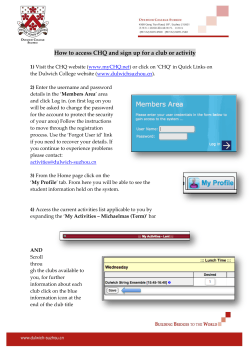
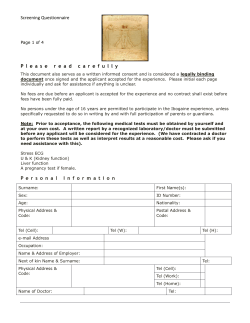
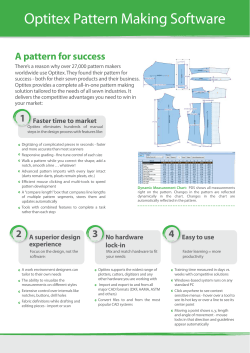

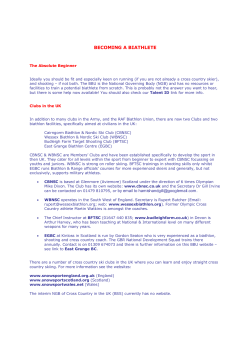
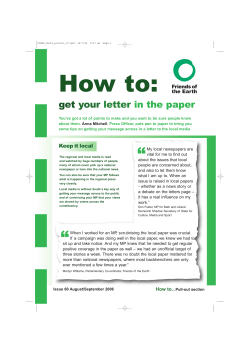
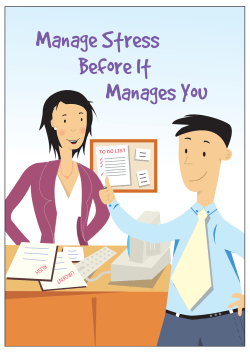




![This article was downloaded by: [Solberg, Harry Arne] On: 12 February 2010](http://cdn1.abcdocz.com/store/data/000246417_1-7a39defea5cd4cbcfa2c1cb2491080f7-250x500.png)



